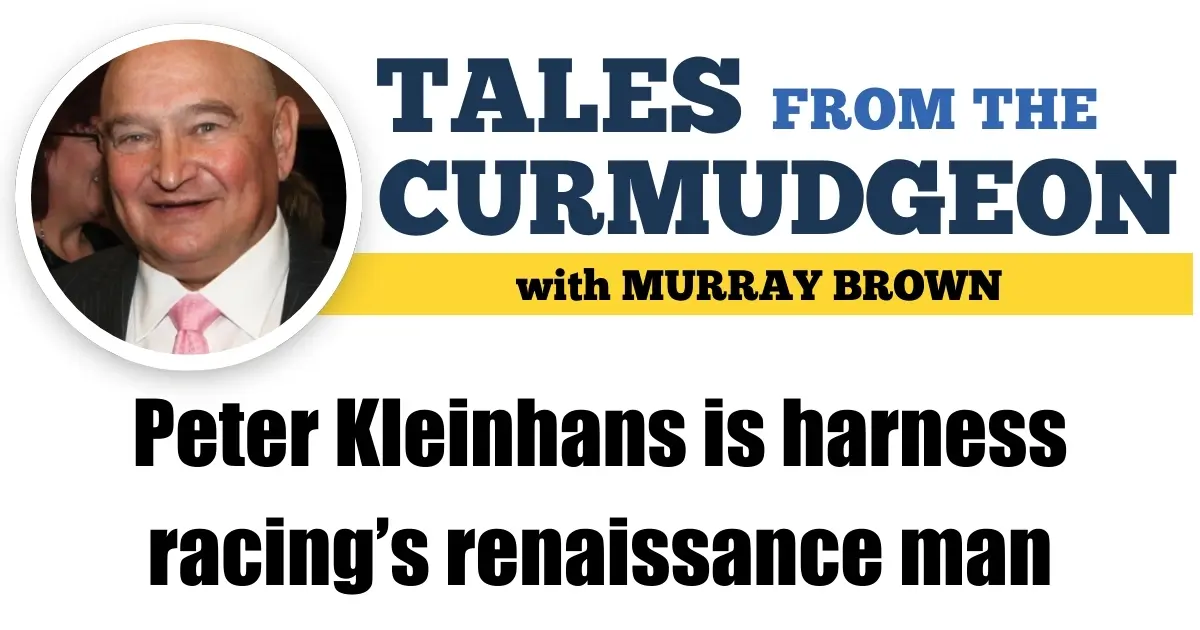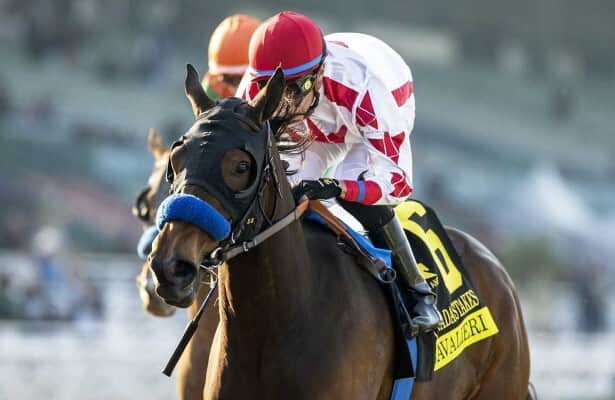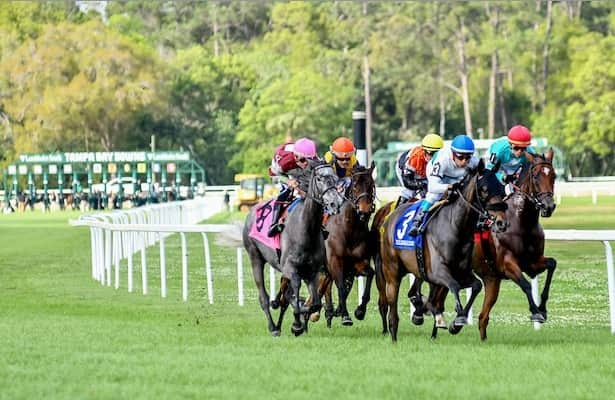Peter Kleinhans is harness racing’s renaissance man

by Murray Brown
Among a host of interests, Peter Kleinhans is a songwriter, singer, guitar player, part owner of three racetracks, non-practicing lawyer, race caller, harness breeder, driver and trainer, writer, livestock farmer and investor in his family’s Manhattan real estate firm. Among his many talents, he believes his greatest to be as devoted father to his 20-year-old son who is a sophomore at the School of the Art Institute in Chicago and his 15-year-old multi-talented daughter who never ceases to amaze him. He and his wife, Ivy, are expecting a son in February.
I would refer to him simply as being a renaissance man. One doubts that there is anybody else in our sport who juggles as many interests as Kleinhans does.
Since this is a column usually devoted to harness racing, let’s start with it and then move on to some of your other interests. How did you develop your interest in our sport?
“I was first taken to the runners at Belmont Park when I was only 6 years old. I was first challenged by the mathematics involved in trying to pick winners. I’ve been interested in trying to solve math puzzles all of my life. I first went to college at Carnegie Mellon near Pittsburgh. While there I took courses in creative writing and philosophy. I started going to the races at The Meadows. At the time, The Meadows had a full-time harness racing show as part of their daily racing program. I would regularly appear on it as a color commentator. I would also sub for Roger Huston calling the races when he was not able to be there. All the while I was still going to school. I loved calling the races. I still do.
“I eventually landed a job calling races at a racetrack called Lakeshore Meadows. Lakeshore Meadows existence was unfortunately short lived. I also trained a few horses which were racing at The Meadows. You might get the idea that I am somewhat of a wanderer. You would probably be right. All my life I’ve tried to and usually succeeded at doing more than one thing at a time.
“From 1995-98 I was the regular race caller at Hoosier Downs. I then attended Law School at the University of Michigan from 1998-2001.
“I eventually returned to New York. I joined the real estate business which had grown into an empire under my grandmother. She passed in 2001. My grandmother was a real estate savant. She was probably one of the greatest real estate entrepreneurs in the history of the City.
“While back in the City, I also continued my involvement in the sport as both an owner and a trainer. I trained at The Meadowlands, where one of my horses was Enough Talk, the very best horse I, or I would guess most people, have been associated with. He was good enough to get me a trip to Sweden where he was invited to compete in the Elitloppet at Solvalla. He was a legitimate free-for-all trotter. He earned $1,839,563. He is now 21 and retired at a small farm I own in Flemington, NJ.
“When the stable area at The Meadowlands was shut down, I, for all intents and purposes, gave up my training career.”
Were you ever a gambler, betting on the horses?
“Of course. I’ve been a problem solver all of my life. At least, I’ve tried to solve problems. There were times where I was successful at betting — other times when I wasn’t near as good at it.”
When Jeff Gural rescued The Meadowlands from oblivion in 2010, you were among those who joined him in that venture.
“That is true, but actually I was involved in track ownership with Jeff before that — first at Vernon Downs in 2005 and shortly thereafter at Tioga Downs. Both those tracks have proven to be good investments, but unfortunately not because of harness racing. Tioga now has a full casino which makes it profitable. Vernon has the slots in addition to racing. We were able to sell our interest in Vernon at a decent price and still retain management rights. Although I cannot say that The Meadowlands is exactly flourishing, I can say that it is doing significantly better than it was because of sports betting.”
Let’s move on to the law. You are a lawyer who has passed the bar in New York but you have never practiced?
“Yes, I suppose you can say that. I loved the law, but I could not find an area of it that I liked enough to do it even remotely on a full-time basis. I’ve attended more schools than the average guy. I started out at Carnegie Mellon, then I went to the University of Michigan and then went to NYU from where I wrote the bar exams. The one constant through all of my education has been race calling. At first thought, I’m not sure at how many tracks I’ve called races — The Meadows, Lakeshore Meadows, Hoosier Park, The Meadowlands, Freehold and this past year at Oak Grove in Kentucky.”
You have recently taken to writing. You have an article in an upcoming edition of Hoof Beats magazine?
“I suppose it was about time that I put some of my education in creative writing learned at Carnegie Mellon to use. I have an article coming up in that magazine on 22-year-old Marvin Luna, a young man who I consider to be a budding superstar in the sport. He was the leading driver at the Oak Grove race meeting in Kentucky.
“He went to a very good school, that of Tony Alagna, where he developed into a very good horseman. Tony started using him for educational purposes (both for the horses and Marvin) with some of the royally-bred youngsters in his stable. In the last couple of years, Marvin has gone out on his own. He races mostly in Kentucky and Indiana, where he gets drives from many of the top stables when they become available. If we had more young people with the positive enthusiasm of Marvin in the sport, we would be a be in a better place.”
You have recently become a regular at the amateur races at The Meadowlands.
“I started my hands-on apprenticeship in the sport jogging horses at The Meadows. I then progressed to training a few. Since then, I’ve occasionally driven, usually only the horses that I’ve owned and trained. Since the startup of the amateur series at The Meadowlands, I’ve been driving more regularly, usually with horses trained by Symon Spicer. I know that I’ll never be good enough to compete against those who do it for a living. Having said that, I do think that I now drive better than I ever did and I like to think my driving skills keep improving.”
Which is your favorite horse?
“Without a doubt that would have to be Enough Talk. The old guy is the type of horse that people dream of being associated with. He was a true free-for-aller who took me to places I could only dream of ever going. There are very few people who are blessed enough to have an association with a horse as good as he was.”
You are also a farmer?
“I suppose you could say so. We own a small farm in Flemington, NJ, where we raise chickens, cattle and lamb for limited consumption; basically, only for our family and friends.”
Can you tell us about your musical skills?
“I write music and sing and play what I, as well as other people, write. I perform fairly regularly at The Bitter End in Greenwich Village in the City. I’ve also performed at The Winery. I don›t know how good I am at it, but it’s something I enjoy and really love doing.”
Do you have a day job and if so, what is it?
“I really don’t know how to answer that. I am one of the individuals involved in a New York City real estate business built by my late grandmother. She was a genius at what she did. Unfortunately, New York real estate is hurting right now. There is probably more vacant office space in the city than there has ever been. I suppose this is because of the effects of COVID, where many people began working from home. Another factor is that many companies have moved to more tax friendly states such as Florida, Texas and Delaware. Yet regardless of these problems, one of the puzzles about the City is that they keep building new places just as much as ever.”
Related
Leading Parx jockey Sanchez will serve 7-day suspension
Photo: Jason Moran / Eclipse Sportswire Jockey Mychel Sanchez will serve a seven-day suspension and pay an additional $1,750 in fines
Bill Mott talks about plans for Sovereignty, Just F Y…
Photo: Gulfstream Park / Lauren King Sovereignty, dramatic late-running winner of the Fountain of Youth (G2) March 1, is being pointed
Up-and-coming Cavalieri chases Grade 1 glory in Beholder Mile
Photo: Santa Anita / Benoit Photo Cavalieri and Alpha Bella, who finished one-two in the Grade 3 La Cañada in January at Santa Anita,
4 stakes showcase shipping stars on Tampa Bay undercard
Photo: Gonzalo Anteliz Jr. / Eclipse Sportswire The stars will shine Saturday at Tampa Bay Downs, and not just in the Grade 3 Tampa Ba











